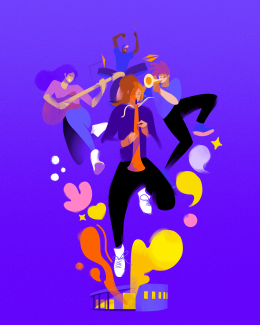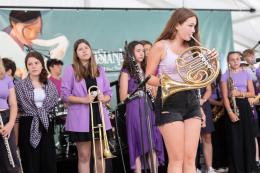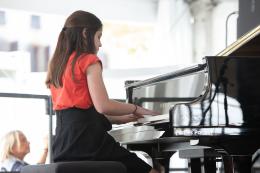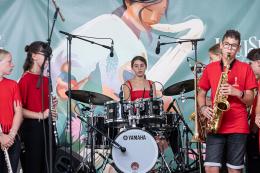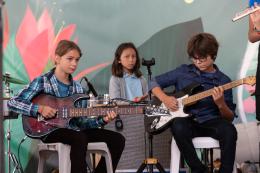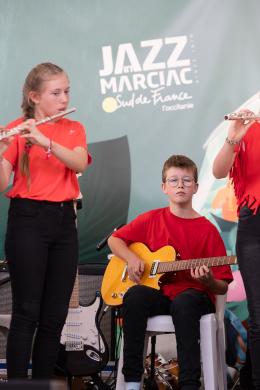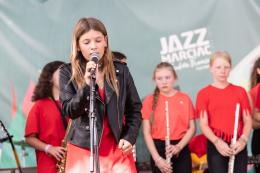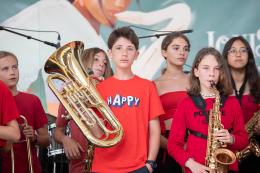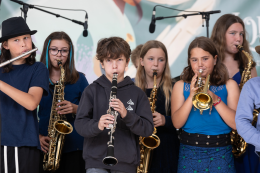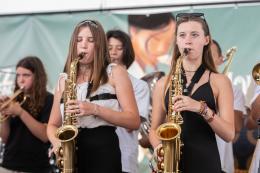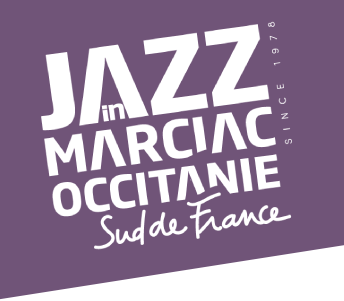JAZZ AT THE COLLEGE
The Jazz In Marciac Festival needs no introduction, it has been internationally recognised for several years. However the human and cultural impact of this major Festival remain almost unknown.
In September 1993, the College - an Establishment of Secondary Education, launched its workshop Initiation in Jazz Music which covers the college's entire curriculum from the 6th. to the 3rd. grade.
An essential expression of 20th. century music, jazz is closely intertwined with human history due to its origins and its constant evolution –and it is also an exceptional cultural and pedagogical instrument..
Since music develops and brings out the child, and music groups train and structure them, jazz at the college is a grand concept which invites young individuals to freely express themselves.
Wynton Marsalis, the famous patron of the College's first promotion, fondly recalls during each master-class that music is first of all played as a game. It is up to each individual to find their learning path, to discover their personal fulfilment. Jazz is, often capable of helping and supporting the student in their general studies. It is an educational experience for the adolescent!
This initiative of jazz at the college which perfectly weds the idea of creating rural cultural spaces linked with the educational system, was able to capture the imagination of the National Educational system, the Ministry of Culture, and the Conseil Général of the Département of the Gers.
This workshop, available in 5 hour weekly modules for 5th. and 6th. grade classes, and in 4 hour weekly modules for 3rd. and 4th. grade classes, is completed by a practical instrumental workshop of 2 hours, and an initiation in the main schools, or currents, of jazz, is offered as an option. The instruction is free, as are the materials and instruments which equip the 'Music Islet'. It is offered in addition to the obligatory curriculum elements, and continues right up to the 3rd.grade. Admission is based on the dossier presented and does not depend on prior musical experience. It is normally undertaken right from the 6th.grade but an exception can always be made. The only requirements are a satisfactory academic level and an affirmed taste for music.
Our teaching approach blends traditional musical training with a specific approach linked to the pedagogical content of the project and the originality of the material used. An approach to the harmonic and rhythmic basics through an introduction to keyboards, an initiation into the fundamental roles played by the bass and the percussion, sung readings (reading music, voice practice, application to sung jazz) and collective vocal activities using jazz standards and allowing for the beginnings of improvisation, are all offered. Meetings with famous jazz musicians, and regular auditions are organised throughout the year during the winter sessions.
Workshops are organised within the framework of the Jazz In Marciac festival where students have an opportunity to perform in public under the patronage of famous musicians.
The education offered is identical to that of other establishments in all other disciplines - apart from musical practice. A student can, at any moment in the college cycle, leave the music stream and enter another class without running any risk of being penalised.
STUDENTS' HOUSING
Students can be hosted as weekly boarders. They are housed in the «Charmes de Gascogne» Annex in four-person bedrooms. This can be complemented with an individualised family assistancet, allowing for the best possible support for the individual student. The Annex includes study rooms and spaces dedicated to listening and cultural activities.
Rêver, croire et construire
On peut enseigner comment trouver sa personnalité, comment la développer et comment l'exprimer à travers le jazz
aime à rappeler Wynton Marsalis, parrain de ces ateliers. L'enseignement concilie une formation musicale traditionnelle avec une approche spécifique liée au contenu pédagogique du projet et à l'originalité du matériel utilisé. Des rencontres avec des jazzmen reconnus, des concerts et des auditions sont organisés tout au long de l'année, le point d'orgue étant la possibilité de s'exprimer en public sur la scène du festival Bis.
L’événement n’était déjà pas passé inaperçu, il a notamment attiré l’attention de Nathaniel Herzberg et de Pascal Dolemieux, journaliste et photographe qui lui ont consacré une longue série d’articles dans Le Monde de l’été 2013 : « 6è Jazz, vingt ans après ». Un travail de fond remarquable que nous avons souhaité mettre ici en exergue car il condense toute notre philosophie. Allié naturel du collège, Jazz In Marciac a comme on le sait permis l’éclosion et l’épanouissement de ces Ateliers en favorisant l’intervention de multiples partenaires, en particulier celles de musiciens de très haut niveau. Pour autant, le but n’a jamais consisté à former l’élite professionnelle du jazz. Il s’agissait d’aider les élèves à construire leur personnalité hors des sentiers battus, de leur insuffler le goût de la création et donc de la liberté, de les aider à découvrir jour après jour le meilleur d’eux-mêmes.
Du reste, comment aurions-nous pu souhaiter autre chose alors que les paroles de Wynton Marsalis, parrain de ces Ateliers, résonnaient à nos oreilles ? « On peut tout enseigner sauf l’essence de la musique, c’est-àdire son esprit, nous avait-il expliqué. Mais on peut enseigner la technique et surtout, on peut enseigner comment trouver sa personnalité, comment la développer et comment l’exprimer à travers le jazz. » Nous ne visions et ne visons actuellement rien d’autre. C’est au fond la meilleure raison de se pencher sur le passé : mesurer le trajet accompli et, le cas échéant, se sentir confortés dans la direction suivie. En retrouvant les élèves qui, en 1993, étrennaient les Ateliers avec cinq heures de cours de musique par semaine et un atelier supplémentaire de pratique instrumentale le mercredi après-midi, en les interrogeant sur ce que cette formation spécifique leur avait personnellement apporté, Nathaniel Herzberg et Pascal Dolemieux nous paraissent démontrer le bien-fondé de notre initiative : oui, nous avons eu raison de rêver, de croire et de construire. Parmi ces anciens élèves, un ingénieur, un vendeur d’automobiles, une potière, un chercheur à l’Institut Pasteur, un web designer, une vulcanologue…
Certains ont même eu la curieuse idée de devenir musiciens… Chacun a ressenti à sa manière son passage au collège de Marciac, chacun entretient des rapports particuliers avec le jazz et la musique en général, mais nous voulons leur dire sans démagogie qu’ils nous inspirent tous la même fierté : grâce à eux, une voie féconde a été ouverte. Nous espérons que l’Education Nationale aura la sagesse de ne pas s’en priver. Au besoin, il faudra lui rappeler les mots de Lucie : « Aimer les chemins non balisés […]. C’est ça le jazz, cette liberté de penser, d’agir. Considérer les imprévus non comme des dangers, mais comme des opportunités à saisir. Ce n’est peut-être pas l’idéal pour se poser, mais ça donne du sens à la vie.
